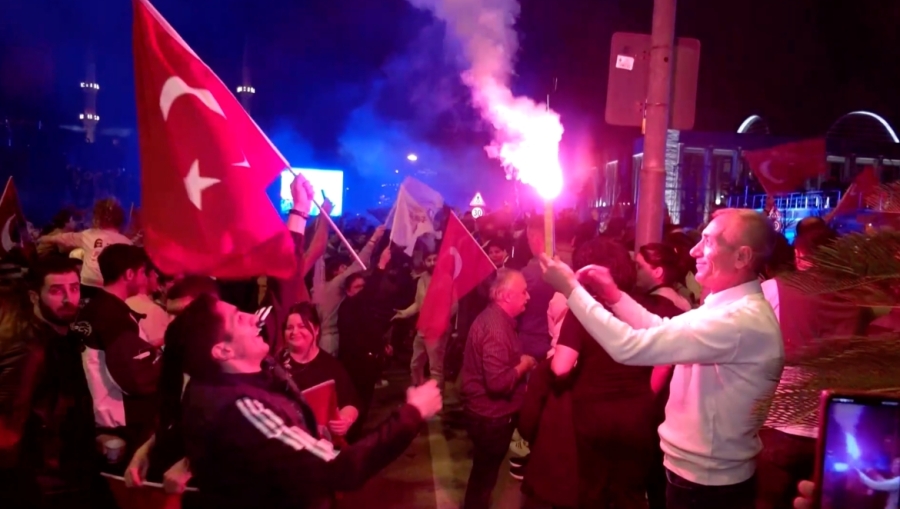In Sunday’s nationwide local elections in Turkey, President Tayyip Erdogan and his party experienced a significant setback as the Turkish opposition demonstrated its political influence, particularly with Istanbul Mayor Ekrem Imamoglu emerging as a prominent rival to the president.
With the majority of votes tallied, Imamoglu held a notable lead of 10 percentage points in the Istanbul mayoral race, the country’s largest city.
Additionally, the Republican People’s Party (CHP), founded in 1919 by Mustafa Kemal Atatürk, the country’s first president, retained control of Ankara and secured 15 other mayoral seats in cities across Turkey.
This electoral outcome stands as one of the most substantial defeats for Erdogan and his Justice and Development Party (AKP) during their lengthy tenure in power, possibly indicating a shift in the nation’s political landscape.
Erdogan acknowledged this outcome as a “turning point” in a post-election address delivered after midnight.
Analysts attribute Erdogan and the AKP’s underperformance compared to pre-election polls to various factors including soaring inflation, dissatisfaction among Islamist voters, and Imamoglu’s broad appeal extending beyond the CHP’s traditional secular base in Istanbul.
Imamoglu, 53, conveyed a message of national significance, asserting that those who fail to comprehend the electorate’s message will inevitably face consequences.
He addressed a crowd of jubilant supporters, some of whom called for Erdogan’s resignation, emphasizing the significance of the election results as indicative of citizens’ sentiments.
Erdogan, who previously served as the mayor of Istanbul in the 1990s, vigorously campaigned leading up to the municipal elections, which were viewed as a barometer of both his party’s support and the resilience of the opposition.
Speaking at AKP headquarters in Ankara, Erdogan acknowledged the significant decline in his alliance’s popularity across the nation and pledged to heed the message conveyed by voters, expressing readiness to rectify any mistakes and address deficiencies in the years ahead.
Meanwhile, in Ankara, supporters gathered to celebrate the re-election of CHP Mayor Mansur Yavas, who decisively defeated his AKP opponent, adding to Erdogan’s electoral disappointments.
According to official results from nearly 93% of ballot boxes in Istanbul, Imamoglu secured over 50% of the vote, while his AKP challenger trailed behind at around 40%.
This margin of victory was unexpected given earlier predictions of a closely contested race in Istanbul and potential losses for the CHP elsewhere in the country.
Notably, partial official results reported by the state-run Anadolu Agency indicated that the AKP and its primary ally conceded mayoralties in 19 key municipalities, including significant cities like Bursa and Balikesir in the industrialized northwest.
This trend possibly reflects economic strains experienced by wage earners in those regions.
Moreover, the CHP garnered a slight lead in the nationwide popular vote, marking the first time in 35 years that the party has achieved such a feat.
Mert Arslanalp, an assistant professor of political science at Istanbul’s Bogazici University, characterized the election outcome as Erdogan’s most significant electoral defeat since assuming national leadership in 2002.
Additionally, the Democratic Regions Party (DEM) reaffirmed its stronghold in the mainly Kurdish southeast, securing victories in 10 provinces.
Notably, previous elections in this region have led to the replacement of pro-Kurdish mayors with state-appointed trustees due to alleged militant affiliations.
The election day was marred by instances of violence, including clashes in the southeast resulting in casualties, as well as altercations leading to injuries reported in various parts of the country.
Despite these incidents, the electoral process proceeded, culminating in a notable electoral shift with implications for Turkey’s political trajectory moving forward.
Click here for more News & Current Affairs at EU Today
_________________________________________________________________________________________________________

Follow EU Today on social media:
Twitter: @EU_today
@EU_sports
Facebook: https://www.facebook.com/EUtoday.net/
https://www.facebook.com/groups/968799359934046












